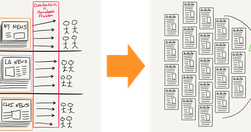Relevant Overviews
the big media institutions knew that they really couldn’t leave their business models, they were locked in... there really is an open question to whether digital journalism will replace the profit margins of traditional journalism... one huge issue in journalism today is how a couple places, particularly Facebook, are becoming a major source of…
Circa is indeed returning, but it won’t be the Circa its users remember.... “an independent digital news site aimed at the new generation,” building on the “intellectual property and technology of Circa News.”

Americans say they want accuracy and impartiality, but the polls suggest ... most of us are seeking affirmation. Americans want the news to be patriotic ... The news media is most valued when it reflects our best selves... the Internet has ... enabled us to construct digital silos, battlements from which... we fire invective on the people below…

news operations are... losing a degree of ownership over their audiences... the number of people they reach is potentially greater than ever [but] through much larger third parties... coming to terms with just how directly their industry’s business model is coming into competition with that of their new, and much larger, partners... The tec…
In this week’s edition, a months’ reading - some 30 posts - on social media, digital transformation, content/system design and EuroPCom2015. But first some news from me

A quick post to Medium in response to: Facebook Will Be Every Publisher’s CMS And That Is Probably A Good Thing: For a publisher to adopt Facebook as their CMS would be a form of surrender, handing over their future to someone else. - I don’t know if you’re wrong, but I hope you are — Medium
The List App has already drawn interest from a slew of news organizations... We talked to audience development experts ... figure out which strategies appear to be working well and get a sense of the app’s possibilities... Posts that typically do well manage to be simultaneously entertaining and informative, combining a light tone with a list o…
Facebook and Apple... have chosen to focus on a future that takes the shape of an article... largely developed in response to the constraints of print ... a great opportunity for news organizations themselves to rethink those assumptions... considering the time scales of our reporting in much more innovative ways. Information should accumulate …
As we head deeper into the annual bloodletting that is news media budgeting for the new year, here are 10 of my top questions that I think we’ll talking about into 2016.... (my faves): Vice, Vox Media, and BuzzFeed have seen hundreds of millions in investment... we have word that Business Insider will test reader revenue... Who will follow s…

The hip but not trendy City Room launched on June 14, 2007, a year when “blogs were the wave of the future.”... The difference between a blog and a news site is no longer a meaningful distinction: all news is posted as soon as it breaks and is then updated. Just think: when was the last time someone used the word “bloggy” to describe the tone o…

Where I think Circa took a step forward ... the idea that we could ... take ANY story and add a structured element to it — even if the only structure was “this item read, this item unread.”.. I do think there are a few concepts that Circa created and executed upon that were truly “inventions”... The concept of atomizing news ... allowing a r…
VICE News, the journalism outfit within VICE Media's sprawling international empire, just added another outpost to its growing list of foreign editions... English-language expansions in countries such as Australia and the United Kingdom allow the outlet to operate for 24 hours... Each edition can also cultivate local sources by writing primaril…

Millennials — a massive, influential demographic that grew up connected to the Internet, social platforms, and smart devices... have expectations about the reliability, tone, transparency, sharability, and relatability of the content they engage with. Newsrooms must meet and build upon these expectations to captivate a generation that is shapin…

"Accelerated Mobile Pages speed up mobile page load times through a new open framework called AMP HTML, which Google says "allows websites to build light-weight web pages." Google says it has nearly 30 publishers signed on to participate in the project, including The New York Times, Vox and Gannett." (What was the point posting each of the 6 ar…

the Google standard gives publishers a streamlined page-loading script they can use that takes advantage of smart caching of content—either on their own servers or on Google’s servers—to make the various elements load faster...an order of magnitude faster than the typical mobile page... a completely open standard that any publisher can implemen…
Media Cloud... is an open source, open data platform that allows researchers to answer complex quantitative and qualitative questions about the content of online media... by collecting and analyzing the news stream of tens of thousands of online sources.... academic researchers, journalism critics, policy advocates, media scholars, and others c…

It’s hard to feel sorry for the news organizations that have utterly failed to pay enough attention to the top story of a generation. It’s one thing to bury the lede. It’s another to allow it to bury your industry... But ... the demise of reporting outfits ... is a severe blow to society. It represents the potential silencing of the only voice …

... it’s fantastic... there is a lot to nitpick, but it is fantastic from a strategic perspective.... Twitter just reinvented the newspaper. It’s not just any newspaper though — it has the potential to be the best newspaper in the world... imagine a tweet-based newspaper drawn not only from the best sources in a mobile-friendly format, but one …
“moments” are mini news digests of tweets across a range of topics... with splashy full-screen photos and videos. Each individual moment is made up of about 10 tweets... allows users to follow stories they’re interested in for a limited period of time... clearly targeted at curious or casual users... a “catch-me-up” type of news digest, using t…
Conversations about the intersection of news, technology, and culture. - Front Page - The Future of News : The Future of News
For the purpose of media pluralism, an emerging concern is how to ensure that the activities of these powerful platforms do not lead to a reduction in the quantity and quality of content actually available to consumers, and/or do not undermine democratic communication (e.g. through the suppression or arbitrary selection of information). Their …
the concerns and questions new information intermediaries bring to the table are explored, particularly in regards to the effect they have on media diversity. Additionally, Helberger looks into the regulatory options for safeguarding media pluralism and regulating these new gatekeepers, who are increasingly in control of consumer data. This art…

Google and Twitter to help publishers show “instant articles” to people who use their services on mobile phones... Twitter users or Google search users who click on a link while using their phones will see full articles pop up on their screens almost immediately... an open source project, and hope to convince multiple tech companies to adopt it…
an app that combs through your Twitter or Facebook feeds, identifying the links being shared the most by your friends... a very efficient way to use the curation you’ve already done of your Twitter followers to curate news... what we’re not doing is semantic analysis, and scanning keywords in articles. Nor are we using human editors ... If …
Here’s how BuzzFeed, The Economist, The New York Times, Quartz, Vox, and Yahoo News slim down a day’s worth of news into manageable forms. Every day, readers are faced with a firehose of news online. News organizations realize this, and they’re trying a bunch of different ways to make the news more manageable — creating chatty summaries of thei…
News isn’t just a product, it’s a community... How do you start a river, from a content point of view? It’s just a list of feeds. You can add to the list, or remove from the list. You’re the curator, though you’re not just curating stories, you’re curating flows. - Dave Winer: Here’s why every news organization should have a river » Nieman …

Facebook... have, as I speculated earlier, built their system around RSS. This means there can be interop between all the big companies --Twitter, Google, Apple, Facebook -- now building new news systems... No publishing silos. Let news flow where it wants to. And let competitors arise who may do more interesting and useful things with news tha…
I spoke to seven news organizations - Recode, The Verge, Reuters, Mic, Popular Science, The Week, and USA Today's FTW - about their decision to suspend comments, the results of that change, and how they manage reader engagement now... Here's how they're all using social media to encourage reader discussion. - What happened after 7 news site…

to boost donations and promote their brands... organizations to sensationalize their coverage, which can, in turn, distort public perceptions about the nature of social problems... The NGO sector includes organizations with annual budgets that rival those of small countries, yet many operate with minimal oversight. News organizations can help a…